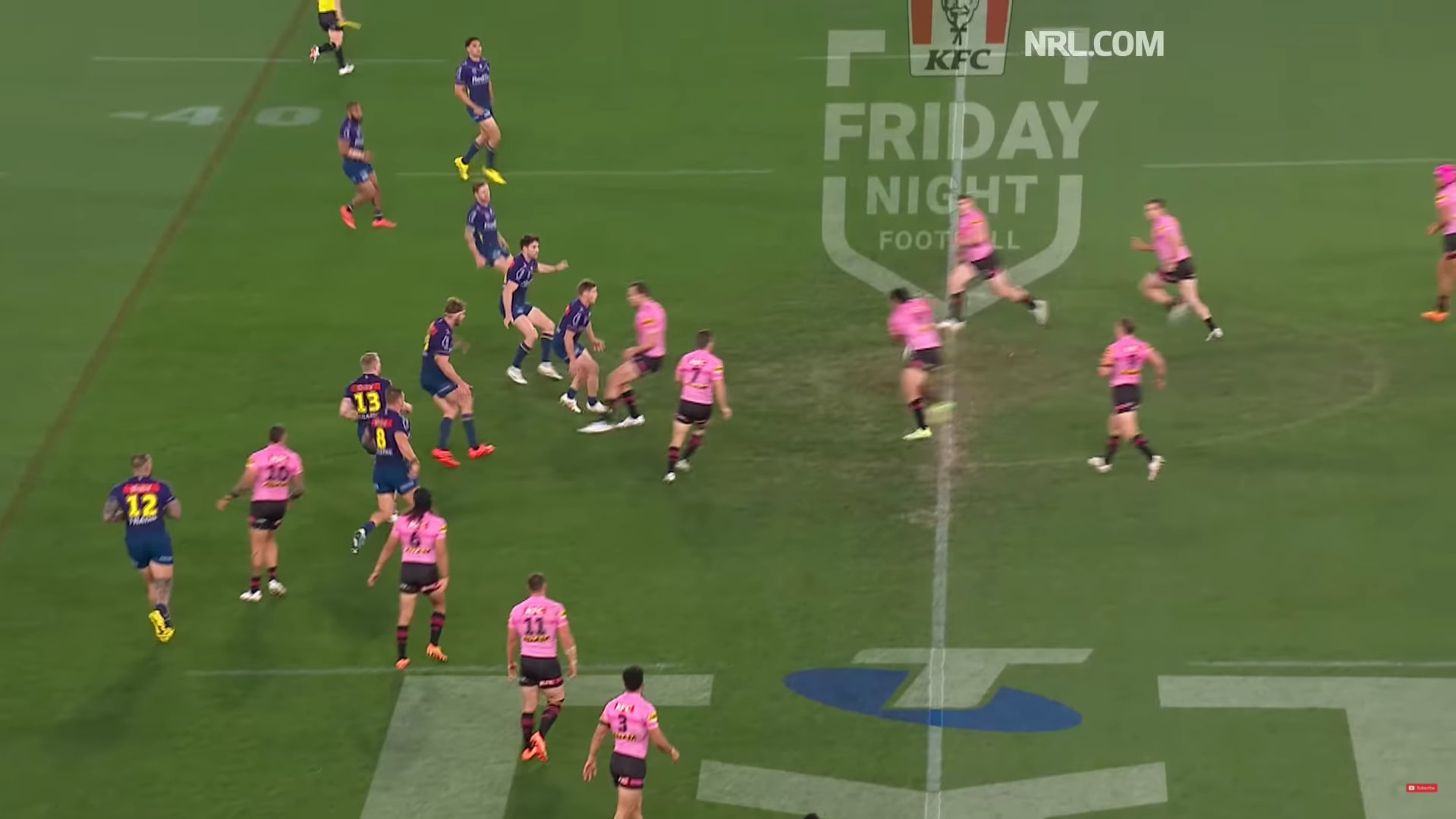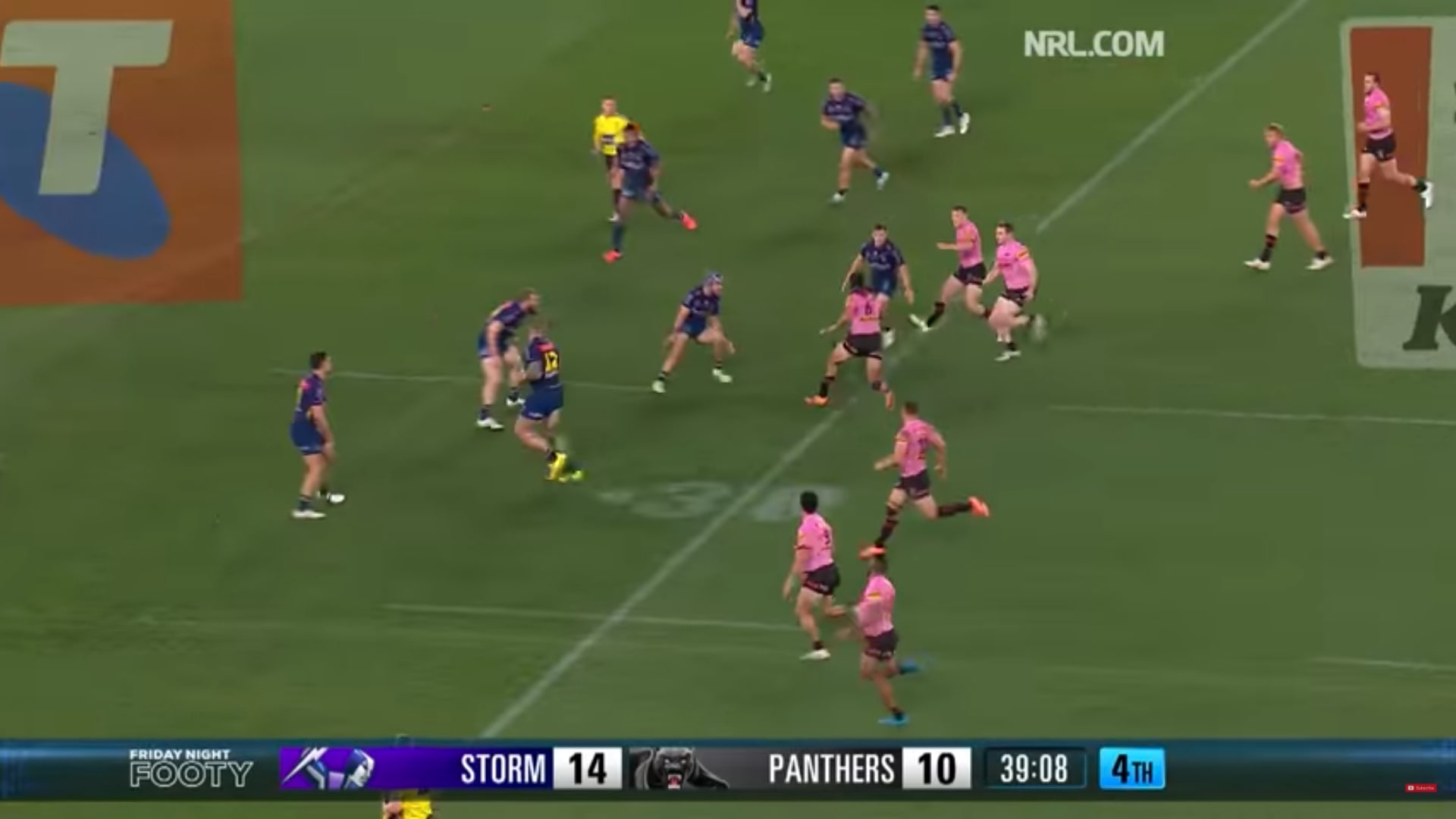There’s a thing about the Penrith Panthers. They win so much that that, most of the time when you try to isolate flaws in their game plan, what you actually find is examples of how they overcome adversity..
Melbourne learned this the hard way in Round 18. For 25 minutes, they dominated the Panthers and led 14-0, really picking holes in how they operated. It might have been brief, but they worked out the system.
Trouble is that the Panthers are incredible problem solvers: their confidence in their system is such that they will back it to win out over 80 minutes, and will lean on their leaders to work out the path to victory.
They also have strike everywhere, which is what happened here. Penrith stuck at Plan A for long enough that they built pressure, before Izack Tago produced several moments that squared the ledger. In the second half, they ran over the top of the Storm.
With the pair set to meet in Friday night’s Preliminary Final, it’s highly likely that Craig Bellamy will have his analysts cutting tape of that opening period, ready to show the Storm boys how they, for a short time at least, rattled the unrattleable.
As a tactical guide to how the Prelim might unfold, it’s worth another look.
But first, the caveats: this was a Panthers without Nathan Cleary, who was injured. It was between Origins 2 and 3, so though nobody was backing up or missing out, there were five tired bodies in Panthers pink and three who had played for the Storm.
It was also under the roof at Marvel Stadium, with the commentators regularly mentioning the dew on the ball, which affected both sides but the Panthers particularly badly.
Still, Melbourne were perfect in the opening stages and, really should have gone on. How?
Bellamy clearly wanted the team to begin with exceptional line speed, usually the Panthers’ best weapon, and to attack at an above-average pace too.
The intensity from Melbourne was relentless and forced four errors in 20 minutes out of Penrith – and this is a team that average eight in a whole game. They only make three more in the hour that follows.
Indeed, the desire to play fast limits Melbourne, too. Nelson Asofa-Solomona makes a play the ball error at one point, planting the ball to get through more quickly, and Harry Grant throws a borderline forward pass under no pressure in an effort to hurry along his work. It’s nominally bad things, but speaks to the mentality that the Storm brought.
There’s endeavour, too. They force four offloads to Penrith’s one, in a team that usually doesn’t excel in that discipline. The Panthers, as Parramatta have repeatedly shown, suffer in second phase and it’s something that the Storm have thought about.
They’re also running a lot of traffic, decoys and supports, with Nick Meaney in particular noticeable around the ruck. It’s all the things that you have to do to beat the Panthers.
Grant was the standout in terms of leading the intensity. Within 90 seconds, he’s in a push-and-shove with Jarome Luai following a late tackle on Jahrome Hughes as he kicked the ball.
It’s a pretty harsh penalty call on the Panthers, and certainly not worth Grant failing to chase a kick to get in a scrap with an opponent, but he does it anyway.
Having seen him do the same in the opening set of the Storm’s finals loss to the Broncos, tussling with Pat Carrigan, it’s hard not to think of Grant as having premeditated the incident, or at least lowered his threshold in an attempt to generate an early excuse to ratchet up the intensity.
The hooker is the one leading the line speed too. After Melbourne take an early penalty goal following the Hughes incident, Penrith get a penalty and do a two-man shift off the tap.
Grant’s there, right in Isaah Yeo’s face, forcing the pass to go behind, where Moses Leota drops the ball.

Credit: NRL/Nine
The desire from Bellamy to up the tempo and throw the Panthers off their game was everywhere to be seen.
To that end, he swapped Tui Kamikamica to the bench and started with Tariq Sims in the middle.
Sims only began tour games all year – including the last round, when almost everyone was rested – but he was crucial to getting the Storm off on the front foot.
He had four carries for 32m – nothing to write home about – but half of those metres were post-contact.
Watching the tape, he’d clearly been told to engage high on the bodies of the tacklers, then get the legs pumping to win the ruck.
In defence, Sims was at the forefront of the line and forced errors through his work getting out around the ruck, with Moses Leota the recipient of his treatment.
Bellamy also started Nelson Asofa-Solomona as an edge for just the second time all year and, like Sims, one of only four times in 2023 where he was given that role.
This was right up there with his best showings of the season, with huge impacts both in attack and defence. He topped both the runs and the metres through half an hour – remember, while theoretically being a backrower – and scored a try of his.
Off the ball, there was a clear remit to intimidate Isaah Yeo and remove his ball-playing to the left.
This came to the fore in the Panthers’ first good ball set. On play two, Nelson crunches the lock and, two plays later, when the ball threatens to come his way again, Yeo plays inside to a forward, without engaging the line on fourth tackle, with shape set up outside.
This very, very rarely happens, and you’d have to deduce that it’s a result of being leathered the last time he touched the footy.
On the fifth, there’s Nelson again, kick pressuring Luai into a poor effort that goes well dead.
“It’s not the worst set of six I’ve ever seen,” said Phil Gould on the commentary. “But it’s in the finals.”
If that was terrible, the next set from Melbourne might well have been perfect. From the 20m tap, they play entirely on the right hand side of the field, repeatedly hitting the same defenders, before Tom Eisenhuth – fresh on for Sims – breaks the line.
Crucially, Grant is behind every play the ball and directs all of the first three tackles at Luai, before taking him on himself, creating the space that Hughes uses to put Eisenhuth through.
Dylan Edwards makes the tackle, but Grant takes the attack back right again, shifting against an unset line. Reimis Smith pokes through and offloads to Asofa-Solomona, with Luai again the man unable to make the tackle. Who could blame him? He was spotted up constantly.
It was a theme throughout. The five eighth averages 15 per game but was already halfway there by the time the try was scored, in the 24th minute, and had missed five, twice his usual tally.
The set after points is actually very good, with four forward hit-ups, a 50m gain and a Cameron Munster that cages Edwards, who can only catch and be tackled.
On the next possession, Will Warbrock makes a yardage error and all their momentum goes up in smoke – and never comes back. The door opens a crack.
The next set, Cameron Munster kicks early to try and reassert the field position, but two set restarts follow and Stephen Crichton is pushed off the ball in an attempt to score for a penalty try. Off the next set, Tago scores with another restart in the middle of the set.
Melbourne crucify themselves. A yardage error, ruck penalties and foul play, all largely under little pressure, kick the door wide open.
From the 25th minute to the break, Melbourne then make four errors, starving themselves of possession. They get five sets – and only complete three – while the Panthers go 11/11 and score three times.
For the first period, when the Storm were on top, they had 55% of the territory and 57% of the ball. They’re great value for a 14-0 lead.
In the second half the first half, it’s 66% position, 62% possession the other way. The Panthers system kicks in and the strange begins, forcing defensive errors and you know the rest.
The point to follow is why this happened, and if it can be replicated for longer than 25 minutes.
Obviously, making errors in yardage then giving away a rake of six agains doesn’t help. This is not a team against which there is much room for mistakes.
The less obvious parts might surround fitness and mentality.
Firstly, the Panthers know exactly what they’re going to do, and challenge other slides to go with them. Melbourne don’t play at that pace every week and couldn’t keep it up.

Credit: NRL/Nine
By the time the Panthers score with 30 seconds of the half to go, Asofa-Solomona is walking, visibly gassed, in no man’s land. He’s there in the yellow boots.
There’s still a few bits to go wrong yet, but the kick falls to Smith, who flicks to Martin for the try.
It was a huge psychological blow. Had Melbourne made it to the break, all bets would have been off.
The Storm could have got their breath back and regrouped, while Ivan Cleary would have been in a rare situation, where he would either have to deviate from Plan A or double down on it.
When they’re sat doing video this week, Bellamy will be battering this 25 minute passage into the brains of his troops, to counteract those physical and mental deficiencies.
He can prove that this kind of strategy can work and that they have the skill and physicality to really disrupt Penrith. He can show them all the good stuff.
Then, he can ram home how close they came. Ten minutes of clean footy was all they needed. It’s been done. It can be done again.






























































































